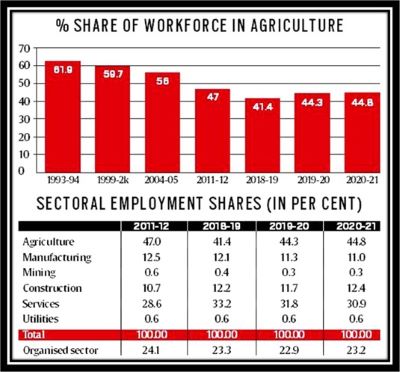Date : 24/11/2023
Relevance: GS Paper 3- Economy - Inclusive development
Keywords: GDP, Low Paid Job, Economic of Scale, Labor-Intensive Industries, Skilling and Upskilling
Context-
The Indian economy grapples with an income problem rather than a growth problem. Despite commendable overall GDP growth, a substantial portion of the population faces stagnant and unsustainable incomes.
The debate over job creation intensifies, with economists questioning the accuracy of government data. Cautioning against sole reliance on statistics, the need to address the root causes of income disparities becomes evident.
The U.S. Paradox: Dissatisfaction Amid Economic Growth
- A parallel can be drawn with the U.S. economy, where despite positive economic indicators, a substantial majority of citizens express dissatisfaction.
- The disconnection between headline numbers and public sentiment becomes a focal point in the lead-up to the presidential elections.
- The emphasis is on understanding what truly matters to citizens, transcending conventional economic metrics.
A Historical Perspective
- looking into India's economic transition, it becomes apparent that a significant challenge lies in the insufficient shift from agriculture to manufacturing.
- Unlike the historical growth patterns of successful nations like the U.S. and China, India attempted a shortcut in the 1990s by moving directly from agriculture to services, particularly in Information Technology.
- However, this shortcut has proven to be a dead-end. The service sector, especially high-end services, cannot accommodate the vast number of young Indians seeking employment, and these jobs often require education levels unavailable in rural areas.
- To address this issue, there is a need for jobs that align with the skills of those transitioning from agriculture, offering a ladder for skill development and higher earnings. Labor-intensive manufacturing, services, and construction represent the crucial first step for the millions leaving agriculture in the past three decades.
The Quality of Jobs: A Critical Dimension
- While many Indians have transitioned out of agriculture in the past three decades, the nature of the jobs available, irrespective of the sector, is problematic.
- Inadequate pay, temporary contracts, and a lack of social security often characterize these jobs. Even within modern manufacturing, the prevalence of contract workers with insecure employment further exacerbates the issue.
- The focus is on reevaluating the concept of "good" jobs, emphasizing the need for positions that provide stability, security, and opportunities for skill development.
Global Economic Transformation: Shifting Paradigms for a Sustainable Future
- The world is at a turning point, necessitating new economic ideas for a sustainable and socially harmonious future. It is suggested that traditional metrics like GDP and employment figures need to be revised to capture the complexities of evolving economies.
- Concepts such as "economies of scope" and local economic webs are posited as potential drivers of future viability, challenging the dominance of long global supply chains.
Reimagining Work and Enterprises: A Green and Local Focus
- In the quest for sustainability, a shift towards enterprises designed with environmental consciousness is predicted.
- The emphasis on "green," "organic," and "local" is expected to reshape economic landscapes, favoring smaller enterprises over large-scale corporations.
- This transition, it is argued, will redefine the criteria for evaluating the viability of enterprises, moving from "economies of scale" to "economies of scope."
The Economic Value of Caregiving: Redefining Social Enterprises
- The economic value of caregiving, traditionally undertaken by women, is considered undervalued in the current paradigm.
- The prevailing economic theory that separates formal economic organizations (corporations) from natural social enterprises (families) is challenged.
- The pursuit of monetary economic value, as measured by GDP, often leads to the neglect of essential caregiving activities, undermining the social fabric.
Paradigm Shift in Economic Theory: Listening to the Unheard Voices
- In advocating for a paradigm shift, emphasis is placed on the importance of policymaking grounded in the voices of those traditionally marginalized in economic discourse.
- Workers, small-holding farmers, small entrepreneurs, and women must be heard and valued in shaping future policies.
- Policymakers are urged to move beyond historical statistics and actively engage with the aspirations and concerns of the people.
Addressing Unemployment: Strategies for a Balanced Approach
Skills Enhancement in Agriculture:
- Prioritize government schemes aimed at upskilling the agricultural workforce.
- Enhance knowledge of efficient farming practices and offer avenues for career transitions.
Promoting Labor-Intensive Industries:
- Identify and support labor-intensive manufacturing sectors such as food processing, leather and footwear, wood manufacturing, textiles, and garments.
- Design special packages tailored to each industry to stimulate job creation.
Decentralization of Industries:
- Advocate for the decentralization of industrial activities to ensure employment opportunities in every region.
- Develop rural areas to alleviate migration pressures on urban job markets.
Conclusion:
Insights challenge conventional economic wisdom, emphasizing the imperative of listening to the people rather than fixating on numerical indicators. The income challenge in India, dissatisfaction despite economic growth in the U.S., and the need for a global economic transformation underscore the urgency for a paradigm shift. As we stand at the crossroads of economic evolution, the call for inclusive, sustainable, and people-centric economic policies resonates as a guiding principle for the future. Policymakers are urged to transcend traditional metrics and embark on a journey of genuine engagement with the diverse voices that constitute the economic landscape.
Probable Questions for UPSC mains Exam-
- How does the historical growth pattern of successful nations, such as the U.S. and China, differ from India's approach to economic transition, particularly in the shift from agriculture to services? (10 Marks, 150 Words)
- In the context of the evolving economic landscape, what specific strategies are suggested for addressing unemployment, and how do they aim to achieve a balanced and inclusive approach to job creation? (15 Marks, 250 Words)
Source- The Hindu









